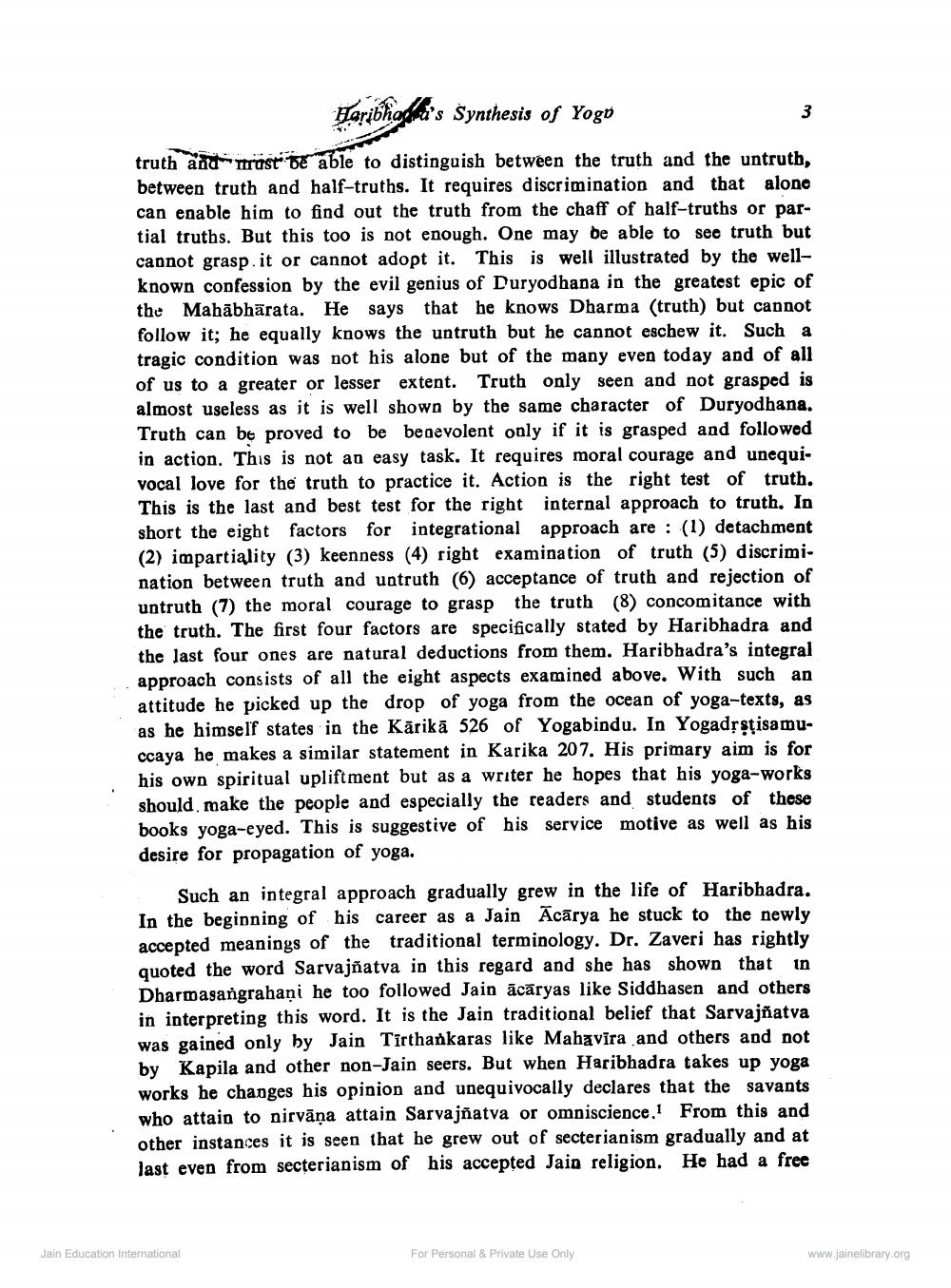Book Title: Sambodhi 1980 Vol 09 Author(s): Dalsukh Malvania, H C Bhayani, Nagin J Shah Publisher: L D Indology Ahmedabad View full book textPage 5
________________ Haribhadali's Synthesis of Yoga truth and Trust Be able to distinguish between the truth and the untruth, between truth and half-truths. It requires discrimination and that alone can enable him to find out the truth from the chaff of half-truths or partial truths. But this too is not enough. One may be able to see truth but cannot grasp. it or cannot adopt it. This is well illustrated by the wellknown confession by the evil genius of Duryodhana in the greatest epic of the Mahābhārata. He says that he knows Dharma (truth) but cannot follow it; he equally knows the untruth but he cannot eschew it. Such a tragic condition was not his alone but of the many even today and of all of us to a greater or lesser extent. Truth only seen and not grasped is almost useless as it is well shown by the same character of Duryodhana. Truth can be proved to be benevolent only if it is grasped and followed in action. This is not an easy task. It requires moral courage and unequivocal love for the truth to practice it. Action is the right test of truth. This is the last and best test for the right internal approach to truth. In short the eight factors for integrational approach are : (1) detachment (2) impartiality (3) keenness (4) right examination of truth (5) discrimination between truth and untruth (6) acceptance of truth and rejection of untruth (7) the moral courage to grasp the truth (8) concomitance with the truth. The first four factors are specifically stated by Haribhadra and the last four ones are natural deductions from them. Haribhadra's integral approach consists of all the eight aspects examined above. With such an attitude he picked up the drop of yoga from the ocean of yoga-texts, as as he himself states in the Kārikā 526 of Yogabindu. In Yogadşstisamuccaya he makes a similar statement in Karika 207. His primary aim is for his own spiritual upliftment but as a writer he hopes that his yoga-works should make the people and especially the readers and students of these books yoga-eyed. This is suggestive of his service motive as well as his desire for propagation of yoga. Such an integral approach gradually grew in the life of Haribhadra. In the beginning of his career as a Jain Ācārya he stuck to the newly accepted meanings of the traditional terminology. Dr. Zaveri has rightly quoted the word Sarvajñatva in this regard and she has shown that in Dharmasangrahaņi he too followed Jain ācāryas like Siddhasen and others in interpreting this word. It is the Jain traditional belief that Sarvajñatva was gained only by Jain Tīrthankaras like Mahavira and others and not by Kapila and other non-Jain seers. But when Haribhadra takes up yoga works he changes his opinion and unequivocally declares that the savants who attain to nirvāņa attain Sarvajñatva or omniscience. From this and other instances it is seen that he grew out of secterianism gradually and at last even from secterianism of his accepted Jain religion. He had a free Jain Education International For Personal & Private Use Only www.jainelibrary.orgPage Navigation
1 ... 3 4 5 6 7 8 9 10 11 12 13 14 15 16 17 18 19 20 21 22 23 24 25 26 27 28 29 30 31 32 33 34 35 36 37 38 39 40 41 42 43 44 45 46 47 48 49 50 51 52 ... 304
